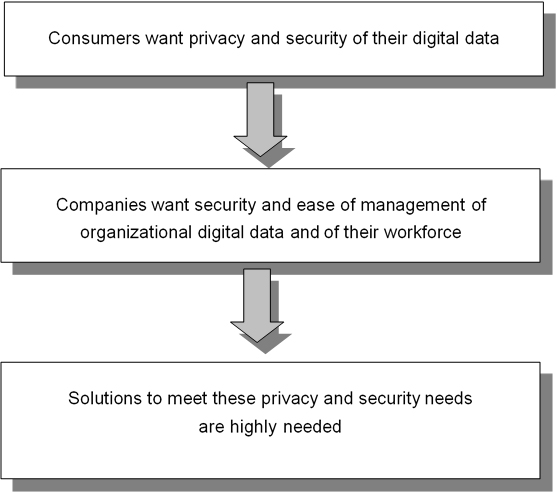The power of a trustworthy information society must be based upon individuals empowered with full control over their personal data. This means eliminating the Big Brother Syndrome, unfriendly eyes tracking sensitive data, and criminal or otherwise undesirable abuse of users’ private information. As a result, people who understand the implications and risks involved in using Internet and Cloud applications to store personal information, feel more comfortable holding their digital personal data under their own responsibility, almost isolated from the Internet, in a similar fashion to the way they carry their own private wallet. While private people have not yet fully grasped these security and privacy implications, companies have already realized the risks and are investing significant amount of their budget to protect company proprietary information.
Worldwide mobile phone users’ numbers have surpassed 5 Billion and are constantly growing. By 2020, 70% of the world’s population will use smartphones. On the enterprise front, Frost & Sullivan survey reveals that nearly 70% of the organizations allow employees to use smart phones for work purposes. As trends such as BYOT (Bring Your Own Technology) and BYOD (Bring Your Own Device) are growing and with increased adoption of web & mobile applications, we hear daily about serious security and privacy breaches for both private people and companies. The global mobile security market is estimated to grow to $34.8B by 2020, up from $3.4B in 2013.
As current trends have increasingly led people to store more and more personal and company information, such as photos, documents, electronic keys and passwords, on smartphones we see on a daily basis publications of extensive data breaches, to both personal people and companies, with grave financial and emotional implications.
The data stored on current generation smartphones can easily be tracked and accessed by intruders. Moreover, information such as passwords and electronic signatures can be hijacked enabling remote site intrusion via using faked identities. This calls for urgent development of efficient tools to protect mobile data security and privacy.
Bearing this in mind, one can draw the following equation where:

In the past two decades the internet has gained tremendous popularity commercially as well as socially, and its immeasurably vast offering of various mobile applications and services has become a crucial and major part of our daily work and social lives. Open systems like the smartphone and clouds enable users to interact freely with any number of various remote service providers, such as health institutions, banks and government agencies, providing unprecedented degrees of accessibility and convenience.
Some people are already aware that this unmatched convenience comes with a price tag: reduced security and vulnerability of personal data. Our most private information may be exposed to frequent abuse, online crime, ID theft and/or privacy violation theft. Even iPhones requiring fingerprint to open the device locally, have not provided a real, trustworthy solution as they are still exposed to hackers from the Internet.
“A large number of apps for iPhones and iPads are susceptible to hacks that cause them to surreptitiously send and receive data to and from malicious servers instead of the legitimate ones they were designed to connect to,” reports Dan Goodin in the popular technology news website Ars Technica.
Even online banking details can be manipulated to display fraudulent information and intercept data sent by users. After an app has been tampered once, it will continue to connect to the hacker-controlled server for an extended period of time, with no outward indication it is doing so. The weakness, dubbed HTTP request hijacking (HRH), is estimated to have affected at least 10,000 titles in Apple’s App Store.
As for privacy pain points, we see Snapchat is a highly popular mobile app, especially with the younger generations. It sends photographs and videos known as “Snaps”. Users set a time limit for how long recipients can view their Snaps (1-10 sec.), after which they will be hidden from recipient’s device and deleted from Snapchat’s servers. According to Snapchat, the app’s users were sending 700 million photos & videos/day, while Snapchat Stories content was being viewed 500 million times/day. Snapchat valuation is $10–$20 Billion depending on multiple sources.
“My concern is that we have developed a generation of people who believe that successful leaders are those with followers. I believe that the best leaders are those that stand for something, who have a point of view. And that point of view must be developed, not alone, but in private, or risk becoming normalized in search of popular support. We are all here to erase the stigma that says hacking has to do primarily with exposing things that others do not wish to have exposed…we must build thoughtfully for our future generations that they may discover the joys of human relationship and individual expression, as protected by privacy” (Snapchat CEO Evan Spiegel).
Two important reasons for the success of Snapchat are:
- They maintain privacy of users,
- They provide safe means of communication.
This is clearly showing how much security and personal data privacy are important to many people.
We are just starting to face the grave consequences and risks of losing our privacy and security. As more and more security and privacy breaches are published on a daily basis, for both individuals, enterprises and countries, we will see a tremendous need for privacy and security solutions for digital users, innovative solutions like POMM™.
David Freidenberg
CEO at POMM Inc.




